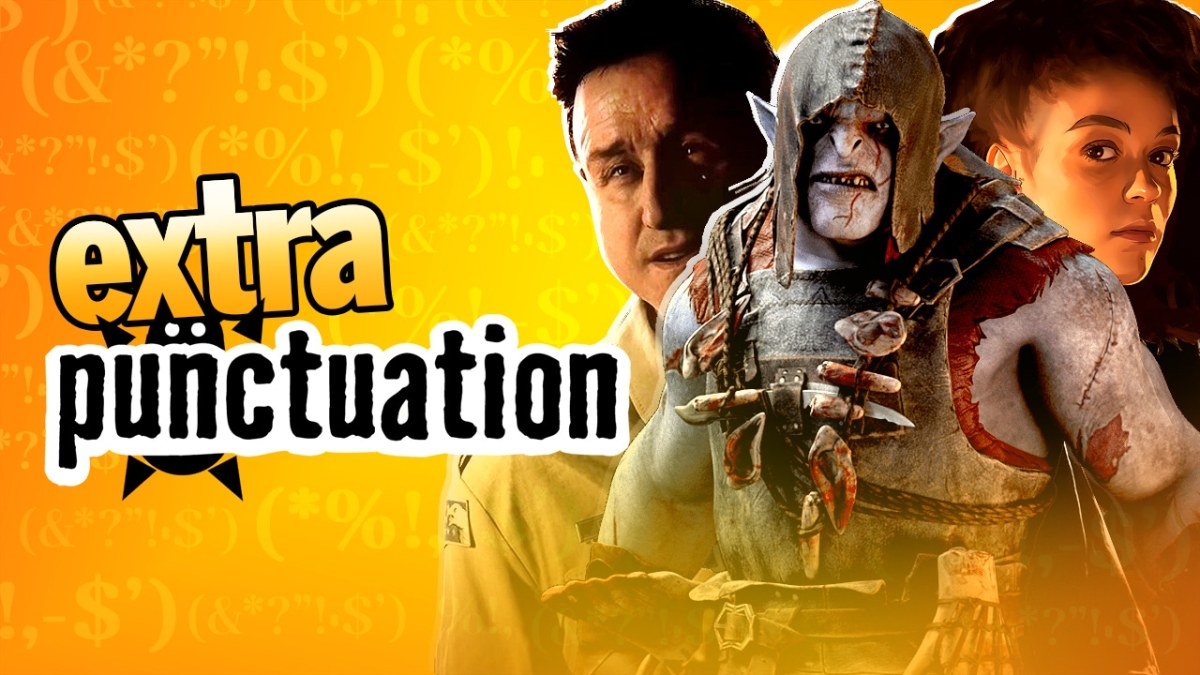This week on Extra Punctuation, Yahtzee dives into the choose-your-own-adventure video game genre and why games like The Quarry are not as innovative as developers think they are.
Extra Punctuation Transcript
During the slow release months I usually go to Nick the editor at the start of the week and go “Whaddaya got?” and he’ll throw out whatever review codes have come in that he thinks I might go for. Not too long ago he threw out As Dusk Falls, a new branching paths narrative game from Xbox Game Studios. And after one look at it, I felt a profound sadness. No, I do not want to play any more fucking glorified Choose Your Own Adventure Books. I already did The Quarry this year and I only did that so I could take the piss out of David Arquette’s horrible facial animation.
Have you noticed how every time one of these Choose Your Own Adventure book games comes out, whether it’s As Dusk Falls or a Supermassive game or something from David Cage’s oevre, the marketing always tries to push the branching narrative thing as some bold new revolutionary method of storytelling? Presumably hoping we’ll have forgotten the last twenty years of gaming history. And I suppose I get exhausted by them now ‘cos I’m sick of repeating that this isn’t a new kind of storytelling. It’s as old as… well, as old as choose your own adventure books. But at least choose your adventure books could actually go on wildly different paths. In a video game the paths more often than not can’t get too far away from each other because they’re all going to be using the same locations and characters. Spending all that time developing assets that a significant percentage of playthroughs aren’t even going to see just isn’t an efficient use of development time.
And what even is the point? To create “interactive storytelling” as what should logically befit interactive media? Allowing the player to feel like they are the ones driving the course of the narrative? No one ever asked for that. No one ever watched Taxi Driver and thought “Well it was a great film, but I’d have liked it even more if it had asked me right before the end whether I wanted Travis to go shoot up the pimp’s house or if I’d rather he went home and masturbated himself raw.” It would have killed all the impact, wouldn’t it. Branching path games have a similar problem to Endingtron 3000 games. You know Endingtron 3000, it’s when a game has multiple endings but it’s only decided by the very last thing you do. And the end result is a game that feels like it doesn’t really have an ending because none of them have any impact when you can just go back and pick another one. Branching path narrative is that writ large, a whole story with no impact.
And it doesn’t feel like the player is driving the course of the narrative because the player usually can’t predict the outcomes of their decisions. It feels more like the game is withholding content and we’re going to have to replay it a few times to get our money’s worth. I’m OK with plot choices if it’s part of an immersive sim or RPG because that’s part of roleplaying and it frequently ties into the gameplay element, you might be deciding whether to get upgrade X or upgrade Y as well as a story point, but when it’s an As Dusk Falls situation and there is no gameplay except the story, there’s no foundation to ground myself on and it’s just a choose your own adventure book.
There have been a lot of great game stories that have given me the strong emotional reactions I crave but I’m prepared to say I can’t think of a single case of a branching narrative achieving that. Undertale? Good ending run’s basically a completely separate plot to the bad ending run, that doesn’t count. Silent Hill 2 and Spec Ops The Line have multiple endings but all the emotional stuff happens before the branch, the endings just change how the protagonist moves on. So in conclusion, can we please pack it in with the fucking choose your own adventure books. They’re way too much effort to make and it never pays off. And the big joke is that there are games that have achieved what these games are trying to achieve – i.e. an interactive narrative in which every player gets a unique experience – with a comparatively small amount of effort.
First case in point: XCOM. There have been individual soldiers in my playthroughs of XCOM games that I have gotten more attached to than every character in every Supermassive game combined. And the game is doing relatively little on its end. It randomizes each soldier’s name, nationality and appearance from a small pool of options, and that’s pretty much it. But you know what? That was enough to get my brain to fill in the rest. So after surviving a few missions Mad Jock McTrousers the Scottish demolitions expert becomes the apple of my eye, and everything he does takes on new depth of meaning. He misses a shot, it’s because he overdid the whiskey on the flight over. He successfully brings back an alien corpse, he’s putting in first dibs to make haggis out of the autopsy remains. Erm. It’s okay, my grandfather was Scottish so I’m allowed to say all this.
It’s like all the game had to do was click the pilot light with the randomized elements it provided and that set off the gas burner of my emotions. And the more effort a game puts into the procedural character creation system, the more variety of qualities and behaviour types it puts in, the better the payoff. A story is basically just the actions of some characters. So a procedural character creator IS a procedural story creator.
Look at the Nemesis System from the Shadow of Mordor games. That’s probably the best example of what I’m talking about in the triple-A space. The actual scripted stories of those games I can take or leave. You’re a grizzled hero type who smoulders generically with suppressed rage, you’ve got a ghost up your bum and you hate things that are bad. And nothing significant can happen because it might mess with the plot of the Lord of the Rings films. But everyone I’ve spoken to who has played those games came away with a different story to tell of what they got up to with the randomly generated orcs. All they had to do was fill up the procedural system with as many different personalities and behaviours as they could think of, wind it up and set it off and people emotionally engaged with it ten times more than they did with the dude with a ghost up his bum.
See, this is what I mean by “interactive narrative.” A branching plot is not interactive narrative. It’s just two standard non-interactive narratives lying next to each other. The one unique thing about video games you need to understand is that ultimately they are an experience created through a combined effort between the player and the author, and that applies to the story as well. All the energy that goes into crafting the different branches of a choose your own adventure game feels so misplaced when I look at what games like Shadow of Mordor have achieved by putting less work into the story. Releasing the reins a bit, and letting the player’s own imagination come and meet them halfway.
Oh, and since I know with 100% certainty it’s going to get brought up in the comments, I’d better acknowledge the following game lest I be accused of forgetting about it: Dwarf Fortress. That was it.






Published: Aug 11, 2022 12:00 pm